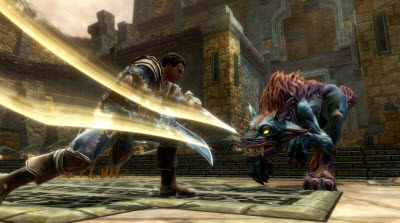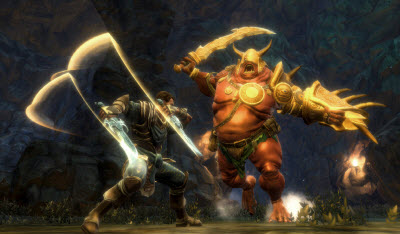
Tuesday is “opening day” for Curt Schilling. The former Boston Red Sox pitcher who won three World Series championships is about to launch his first video game. His game development studio 38 Studios and publisher Electronic Arts are launching the fantasy role-playing game Kingdoms of Amalur: Reckoning.
Years in the making, the title is an adopted one. Schilling created 38 Studios and hired novelist R. A. Salvatore and Spawn artist Todd McFarlane to create a massively multiplayer online game code-named Copernicus. That title is still in the works and Salvatore has created a 10,000-year history to serve as the back story for a series of games. The whole endeavour is one of the biggest bets in video games and shows that passion counts for a lot in this business.
As you’ll see below, Schilling is a gaming nut, and not such a bad business guy. He pounced on an opportunity to create a new game with a shorter development time. When THQ put its Big Huge Studios team up for sale, 38 Studios bought it. So Schilling got together with role-playing game designer Ken Rolston and challenged his team to create a single-player RPG that fit into the 10,000-year history. They came up with an interesting story that involves a mysterious Well of Souls. The well determines your destiny, but as the player in Reckoning, you are the only person ever born who does not have a fate, as pre-determined by the Soul Weavers. You’re a reborn hero, seeking your killer and hoping to change the fate of the kingdom.
June 5th: The AI Audit in NYC
Join us next week in NYC to engage with top executive leaders, delving into strategies for auditing AI models to ensure fairness, optimal performance, and ethical compliance across diverse organizations. Secure your attendance for this exclusive invite-only event.
If players like Reckoning, you can bet there will be more games based on the 10,000-year history. A lot is riding on it. Schilling’s team has more than 400 employees in Providence, R.I., and Baltimore, Md. And Schilling is counting the days as if he were going into another World Series. Among the marketing events coming up: Schilling will promote it on talk shows, and gamers will livestream video of their gameplay on opening day. Here’s an edited transcript of our interview with Schilling.
 Gamesbeat: How do you feel about how this whole process is winding up?
Gamesbeat: How do you feel about how this whole process is winding up?
Curt Schilling: Well, I’m nervous. This is my first opening day in a new job. Five-plus years is a lot. The challenging part is that I’m kind of powerless, we’re kind of powerless now. The game is going to be in players’ hands on Tuesday, and everything we could possibly do to make it the best we could do, we’re done with. Now it’s just the anticipation.
GB: Tell me about the genesis and how long you guys have worked on it now.
CS: The Reckoning project was started as another project at the Baltimore studio, six or seven years ago. The actual beginning of Reckoning was about two and a half years ago when we acquired the studio from THQ. There have been some people on this game for six, seven years now, which is staggering I think. We launched this company with the MMO as the driver behind what we were doing, we always had this … “product ecosystem” is what we called it. We always had that vision from day one of growing a new intellectual property around an MMO as kind of the sun in the solar system. This opportunity presented itself, and once we felt that ethically, from a philosophical perspective, the two studios were aligned, bringing them onto the team so to speak was a no-brainer. They’d been shopping an RPG around and could not get anybody to bite on the IP, this story that they were selling. It was just a match made in heaven, out of a very fortunate circumstance.
GB: Did it take very long for you guys to fit it into the timeline and the universe of what you’ve been doing?
CS: No. Literally, we sent assets down on a Wednesday evening, and Thursday they flew up here with those assets in their engine running in-game. Which was very powerful to see. The engine is ours, exclusively, proprietary, which is awesome. We have thousands of pages of history. We told them, “Hey, find a place in our timeline where you think you can build an awesome single-player RPG.” Ken Rolston and Ian Frazier and those guys looked around and the Age of Arcana was where they settled. That’s the age that Reckoning comes alive in.
GB: Could you remind us of the storyline?
CS: The overarching storyline is centered on immortality. I know that’s not some new revelation, oh-my-God groundbreaking thing, but … R. A.’s a hardcore MMO player, he’s a fantasy guy obviously, and death was always something in gaming that bothered him. And so the Well of Souls and immortality became one of the focal points of our franchise. In our MMO, 2,000 years after the RPG, the Well of Souls is a defined piece of the story, it’s explained through the story. When you backtrack to Reckoning, you are the first person to ever be successfully resurrected with the Well of Souls. The magical piece of this is, you walk into the world with no fate and no destiny, in a world where every human being in the world has a fate and a destiny. When R. A. starts to ask philosophical questions around that it gets pretty powerful. Yes, there are probably basic, everyday life questions around not having a fate, but there are forces of good and evil who quickly become aware of your presence, and your value to them is obviously diametrically opposed…. But that’s the story. You spend the game trying to figure out what it means, but more importantly for the play experience, what you mean to the world.
 GB: It was always an action-focused game, from the start?
GB: It was always an action-focused game, from the start?
CS: Ah…no. It looks that way. But no. Explaining that to people has been the challenge in leading up to the demo and all the marketing. Because it’s hard not to just be visually stunned by the combat and the animation. But there’s a deep, stat-driven, lore-driven, story-driven multi-hundred-hour Baldur’s Gate RPG fantasy game behind this combat. That’s very hard for people to grasp. But yes, the combat is the thing that jumps out at you as what is uniquely different. I think when you see it first, you think God of War or some other combat game. And then you quickly understand when you start playing, there’s a massive, deep, and rich story behind this. It’s hard to imagine that the combat is statistically driven as well, in addition to being a button-masher. That was the challenge, and I think it’s still a challenge. I still think people are hesitant to believe that those two things can coexist, but they do.
GB: What was it like working with folks like Ken?
CS: Oh my gosh. [Apart from] having to introduce him as an internationally celebrated game designer every time I say his name, which is frustrating, it’s been awesome. Ken is what my dad used to call “good people.” He’s genuine, he’s obviously amazingly talented, and he’s got a couple screws loose. That makes it fun. He’s also quietly, deeply involved, in all the good ways. I can think I have good ideas, Bob [Salvatore] can think he has good ideas, and Todd can think he has good ideas. Ken is that guy who can take bigger concepts and make them fun gameplay. I think that was his magic and his touch on all of this. About a month before we went gold, Ken went and played the game for two straight weeks and never accepted a quest. And he wrote up a report about it. When we asked him why, his response was, “Because I wanted to know you could do it in our world.” That’s the depth of the world in this game, and this IP, and everything we do.
GB: You guys seem like you got it out on time. Did it pretty much come in on schedule?
CS: Yep. Well, our initial ship was late last year. We had a chance to look at the competitive window, and another smart decision by EA was to try to move away from that a little bit. I think we found a sweet spot. I think given where we are, given who and what we are, I think this is the best possible time we could have done this. I also think that there’s somewhat of a fallacy around launch windows. I think a lot of people believe game windows to be far longer and bigger than they really are for us as gamers. Outside of an MMO I’m not sure of many games that I don’t beat the crap out of in 30 days. I think it’s a month to month thing. There’s some other games, Plants Vs. Zombies, Railroad Tycoon, Company of Heroes, that I’ll play for years, on and off. But my dedication and commitment to one title and one title only, it’s not as big a window as we sometimes think. But at the end of the day, we finished on time, we finished on budget, and I think we over-delivered in every possible way that anybody outside of the company could have been expecting.
GB: How many hours of gameplay do you think you have here, on the light side or on the heavy side?
CS: I think if you were to go down and play main quest only, and not take anything else or do anything else, I think there’s 40 or 50 hours of gameplay, comfortably. If you are the full completionist, every quest in the world, find everything in the world, craft to max level, I think there’s comfortably 200 to 300 hours of gameplay, maybe more.
